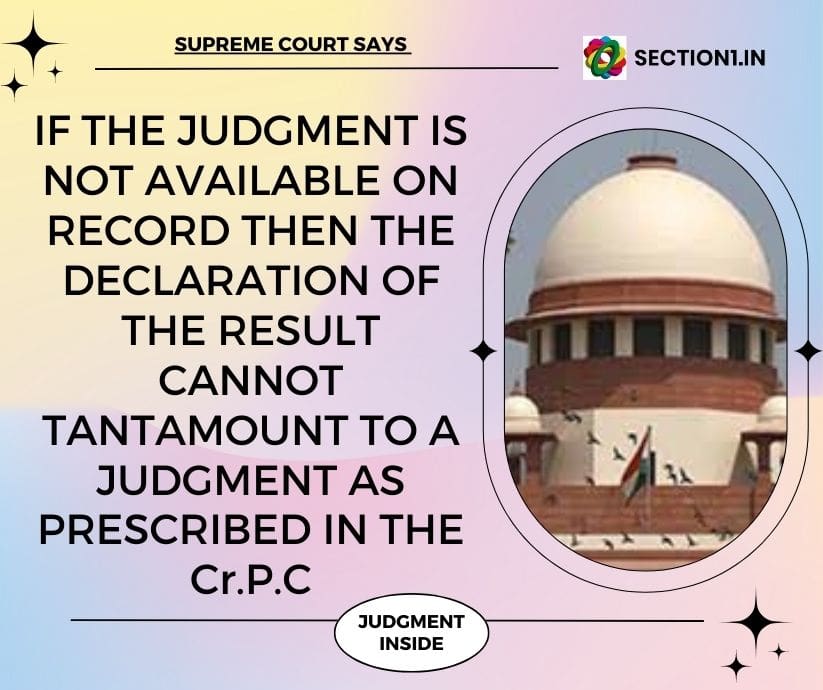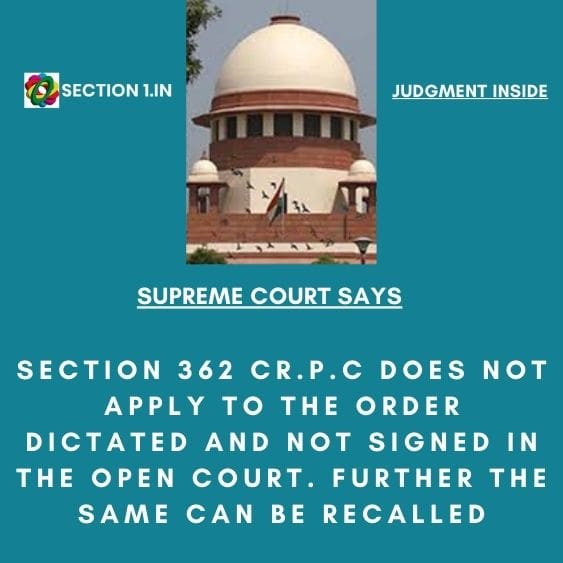A member of the State Bar Council sent a complaint to the Registry of the High Court of Chhattisgarh, Bilaspur alleging that learned trial judge had acquitted the accused persons but no judgment had been rendered. The Registrar (Vigilance) of the High Court issued a memorandum to the District and Sessions Judge, Surguja at Ambikapur on 18.02.2008 to inquire into the matter and submit a report. The concerned District and Sessions Judge submitted the report to the High Court on the same date stating that no judgments were found in the records of such cases. It has also been brought to the notice of the High Court that in sessions trials being Sessions Trial No. 148 of 1999 and Sessions Trial No. 71 of 1995 though the same trial judge had purportedly delivered the judgments but they were not available on record as the judgments had not actually been dictated, dated or signed. Thereafter the matter was placed before the Full Court of the High Court on 04.03.2008 on which date a resolution was passed placing the concerned trial judge under suspension in contemplation of a departmental inquiry. At the same time, the Full Court took the decision to transfer the cases in question from the concerned trial judge to the file of District and Sessions Judge, Surguja at Ambikapur for rehearing and disposal. It is worthy to note here that the concerned officer was put under suspension and after completion of inquiry was imposed with the punishment of compulsory retirement on 22.03.2011. We make it clear that we are not concerned with the said punishment in the case.
xxx
Question of law to be determined
To appreciate the controversy, it is necessary to refer to the order sheet in Sessions Trial No. 71 of 1995. The trial judge on 28.1.2008 had passed the following order:-
“28.1.2008: State represented by Shri Rajesh Tiwari, A.G.P. Accused along with their Counsel Shri Arvind Mehta, Advocate The judgment has been typed separately. The same has been dated, signed and announced. Resultantly, Accused T.P. Ratre is acquitted of the charge under Section 306 IPC. A copy of this judgment be sent to the District Magistrate, Surguja (Ambikapur) through A.G.P. Proceedings completed. The result be noted in the register and the record be sent to the Record Room.”
Be it noted, in the other Sessions Trial, i.e., Sessions Trial No. 148 of 1999 almost similar order has been passed. Be it stated, apart from the aforesaid order, as per the enquiry conducted by the learned District Judge, there was nothing on record. The trial judge had not dictated the order in open court. In such a situation, it is to be determined whether the judgment had been delivered by the trial judge or not.
xxx
We have referred to the aforesaid decision to illustrate that the CrPC confers absolute sanctity to the judgment once it is pronounced. It does not conceive of any kind of alteration.
Section 363 provides copy of judgment to be given to the accused and other persons. Section 364 provides for the situation where the judgment requires to be translated.
It is apposite to note that though CrPC does not define the term “judgment”, yet it has clearly laid down how the judgment is to be pronounced. The provisions clearly spell out that it is imperative on the part of the learned trial judge to pronounce the judgment in open court by delivering the whole of the judgment or by reading out the whole of the judgment or by reading out the operative part of the judgment and explaining the substance of the judgment in a language which is understood by the accused or his pleader.
Trial judge must read the whole of the judgment in the open court
We have already noted that the judgment was not dictated in open court. Code of Criminal Procedure provides reading of the operative part of the judgment. It means that the trial judge may not read the whole of the judgment and may read operative part of the judgment but it does not in any way suggest that the result of the case will be announced and the judgment would not be available on record. Nonavailability of judgment, needless to say, can never be a judgment because there is no declaration by way of pronouncement in the open court that the accused has been convicted or acquitted. A judgment, as has been always understood, is the expression of an opinion after due consideration of the facts which deserve to be determined. Without pronouncement of a judgment in the open court, signed and dated, it is difficult to treat it as a judgment of conviction as has been held in Re. Athipalayan and Ors [AIR 1960 Mad 507]. As a matter of fact, on inquiry, the High Court in the administrative side had found there was no judgment available on record. Learned counsel for the appellants would submit that in the counter affidavit filed by the High Court it has been mentioned that an incomplete typed judgment of 14 pages till paragraph No. 19 was available. The affidavit also states that it was incomplete and no page had the signature of the presiding officer. If the judgment is not complete and signed, it cannot be a judgment in terms of Section 353 CrPC. It is unimaginable that a judgment is pronounced without there being a judgment. It is gross illegality. After quoting State of Punjab and others v. Jagdev Singh Talwandi – (1984) 1 SCC 596 has held as follows:
We have reproduced the aforesaid two passages as the larger Bench has made such observations with regard to unreasoned judgments passed by the High Courts. The learned Chief Justice had noted that the practice is not desirable and does not achieve any useful purpose and it should not grow out of its present infancy. Despite the said observations, sometimes this Court comes across judgments and orders where the High Courts have announced the result of the case by stating “reasons to follow”. We can only reiterate the observations of the Constitution Bench.
Having stated that, as is evincible in the instant case, the judgment is not available on record and hence, there can be no shadow of doubt that the declaration of the result cannot tantamount to a judgment as prescribed in the CrPC. That leads to the inevitable conclusion that the trial in both the cases has to be treated to be pending.
Party
Ajay Singh and Anr and Etc vs State of Chhattisgarh and Anr – CRIMINAL APPEAL NOS. 32-33 OF 2017 – January 06, 2017






